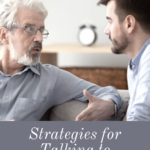
Relationships are rarely completely smooth. There are always some points of contention and drama – times where things need to be addressed.
Sometimes this means confronting people and having difficult conversations. Very difficult ones, at times.
As discussed previously, having such conversations with aging parents really is crucial. Otherwise, important topics might remain unaddressed including end of life planning, assisted living, and caregiver burnout.
But, how do you have good difficult conversations with aging parents?
As in, how do you make sure the conversation doesn’t just devolve into a fiery debate, where each person gets more entrenched in their view? How do you actually move forward? How do you grow the relationship?
What You Can Expect From This Post
First, let’s be clear.
There’s no way to guarantee that your conversation will go well. After all each person has their own biases, views, and emotional reactions, which sometimes clash dramatically. And, sometimes you may not see eye-to-eye, no matter how things go.
However, the techniques discussed in this post can help.
They’re a compilation of powerful ideas and approaches from important books on the topic, including How to Have that Difficult Conversation by Dr. Henry Cloud and Dr. John Townsend and Difficult Conversations by Douglas Stone, Bruce Patton, and Sheila Heen.
Those books each have many strengths, but they also contain a ton of information and have a general focus. In this post, we’re narrowing it down and looking specifically at the interactions between adult children and their aging parents.
Why Talk About Good Conversations?
Writing about conversations might sound strange. After all, we talk to people regularly already.
We know how to talk and how to get our point across. Yet, there are dozens of books on the art of conversation, books that are often incredibly popular.
These books highlight a crucial point – that most of us don’t know how to communicate well. This isn’t so surprising, as we often simply learn communication as we go.
Doing so works well enough in many situations, but leaves us struggling when we need to talk about difficult and emotional topics.
Thankfully, there are effective approaches, ones that help people to come together. Such approaches change the dynamic of a conversation, switching it away from being adversarial towards being productive instead.
Features of a Good Conversation
So, what does a good conversation even look like?
Some aspects are obvious, both for a difficult conversation and a regular one.
Listening is key, as is being compassionate and connected.
Of course, doing so is tricky when you’re talking about an emotional topic. That’s why it’s important to take things gently.
You’ll often find that if you take a compassionate and balanced approach, things aren’t nearly as bad as you first thought. After all, many relationship issues begin when people aren’t honest with one another. Many problems can be resolved fairly easily once you start talking them through openly.
The Role of Curiosity
Books on conversations consider many valuable themes.
But, there’s one piece of advice that stands out – curiosity.
I originally found this idea in the Difficult Conversations book by Stone and it’s stuck with me.
Basically, conversations often end up in a me versus you situation, where each participant is defending their point of view. This can even mean that you’re thinking about your response while you’re listening, rather than really hearing what the other person has to say.
Curiosity is a different approach.
It involves putting your own point of view aside for a while, to truly pay attention to the other person. Try to be curious about what they feel and think, and where those perspectives come from. The more you understand, the easier it is to find a way forward.
For example, a classic parent-child debate is whether the parent should move into assisted living or not. They might be dead set against the idea, while you’re all for it.
With the curiosity approach, you’re trying to understand their concerns. Their fears. Their wants.
In some cases, a move to assisted living represents a serious loss of independence. It also means the senior is giving up on owning their own home, may have to sell possessions, and may end up living in a completely different neighborhood.
Is it so surprising that many seniors don’t want to do this?
Once you understand their true thoughts, you can start to talk about alternatives.
For example, how can you make living at home safer for them? Would they accept at home help if it made you feel happier and kept them independent for longer?
Who’s Right?
Another big issue is the idea of right and wrong in a conversation. It’s easy to default to the idea that your perspective is logical and correct, while they just need to be convinced.
But, of course, they think the same.
You’ve heard the old adage right, there’s two sides to every story? It’s a cliched idea, but still a very true one.
Each person in a conversation has different values, perceptions, experiences, and lives in a slightly different world. Of course they approach things differently.
And, just like you don’t really understand some of their decisions – they don’t understand all of yours either. This is why conversations are so important.
Focusing on curiosity is a powerful tool here. It makes it easier to step away from the right versus wrong game and pay attention to individual experiences.
Other Approaches That Can Help
Of course, curiosity is just one approach. It can make a huge difference in a conversation, but it isn’t enough on its own.
The following approaches can be powerful as well.
- Connect with them emotionally. Have a conversation rather than lecturing them.
- Think about you versus them. Be clear about your part in what is happening, what you feel, and what you want.
- Be willing to be wrong. You don’t know everything. The course of the conversation might show that you’re the one who needs to back down.
- Clarify the problem, including what is happening, the effect on you, and the change you want. Avoid getting caught up in right versus wrong.
- Balance kindness and honesty. Difficult conversations often involve being more honest than you want to be. But, you need to temper this with kindness. After all, you’re trying to preserve the relationship. Too much truth and not enough kindness is likely to cause more harm than good.
- Stay on task. It’s easy to get caught up in defensive reactions, rebuttals, and everything else. You’ll often need to bring the conversation back to the main topic a few times.
- Try ‘when you do this, I feel that’. This phrasing avoids blaming the person for what you feel or making them wrong, but also shows that you are experiencing hurt.
- Affirm and validate. If the person you’re talking to brings up things you’ve done, it can be important to listen, to affirm the importance of what they say, then come back to the topic at hand. Conversations often go better if the person you’re talking to feels heard, but you don’t want the entire conversation to get switched to a completely different topic.
- Be as specific as you can. For example, don’t tell them that they never think about your needs. Tell them about specific occasions and why those mattered. So, if the problem is that they expect you to drop everything, tell them about a recent time where that happened, what you were in the middle of, and what you felt.
- Know the outcome you want and make specific requests. Having an outcomes focus helps to give your conversation and relationship somewhere to go. This is much better than simply giving people a list of complaints and leaving it there. Plus, the other person needs to know specifically what you’re looking for. This won’t always be obvious and leaving them to guess isn’t fair or practical.
- Stay grounded in love and connection. Difficult conversations can quickly turn into arguments. Take the time to stay connected and affirm the importance of your relationship. You might even say that you’re having this conversation to improve the relationship and that you value them.
- Be genuine. Speaking from your feelings and your hurt can be helpful. This makes the conversation feel more real. Plus, this approach is easier for someone to hear than if it feels like you are blaming them the entire time.
- Look to understand, not defend. Sometimes we listen in order to respond or defend, without truly hearing what the other person has to say.
- Communicate limits. If the problem at hand is significant, you might need to put limits in place. If you do, it’s important to communicate these. For example, you might say that if your mother doesn’t give you notice before she comes to visit, then you won’t be able to see her.
- Work on a plan. You don’t need to know all the solutions right from the beginning. Sometimes you can work with your family member to find a solution. This may even be essential, as they’ll have a better sense of what they can do than you.
- Be patient (with limits). Change takes time. Your parent is likely to make some mistakes along the way. Being gracious with mistakes can make the transition easier. Just be cautious of cases where your parent keeps making excuses and doesn’t appear to be making progress.
Things to Avoid During Difficult Conversations with Aging Parents

- Broad sweeping statements, like ‘you’re always inconsiderate’ or ‘you’re never there for me’. Not only are these often untrue, they’re also accusatory and not helpful. Sticking to specific examples is much more powerful.
- Use the word need for a want. It’s tempting to say ‘I need this’ to emphasize the importance of something. This is fine if you’re talking about an actual need, but if you’re talking about something you would like instead, then need isn’t the right word and can make people reactive.
- Labeling. Using labels like selfish isn’t helpful at all. Labels tend to be insulting and they also ignore all the good things that people do. And, let’s face it, most labels aren’t that accurate anyway. Even someone who is often selfish has their good moments too.
- Making them wrong. Saying that they should be doing something or that they’re wrong is dangerous ground. Much of the time, you’ll be talking about your desires versus theirs. For example, telling a senior that they should shower every day isn’t likely to work well. Plenty of adults don’t shower every single day anyway.
- Bouncing off their reactions. Wherever possible, it’s best to stay on track. Try to redirect the conversation back to the topic at hand whenever you can.
- Watch out for trigger phrases. Some words and phrases can feel very confrontational, leading to defensive reactions, like the following:
- You make me feel (your feelings and reactions are your own, no one makes you feel something)
- You need to/we need to
- You should/shouldn’t
- You never/always
- We need to talk
Planning the Conversation
The most important strategy for having difficult conversations with seniors (or with anyone, for that matter) is to plan ahead of time. While you can’t predict how the conversation will go, you can think about likely patterns and how you want to respond.
Doing so has multiple advantages:
- You get to figure out the parts you struggle with and work on them when the stakes aren’t high.
- You can deal with your emotions and reactivity before engaging with your family member – increasing the chance that things will go well.
- You can work out the outcomes you’re actually looking for.
- You can learn and refine strategies for keeping the conversation on track, while still listening to what the other person has to say.
There are a few very important things to consider here.
Work Out What the Issue Is – And What Outcomes You Want
The issue at hand might seem obvious, but take the time to think closely about what is the problem is.
For example, if you live with someone who leaves dirty dishes in the sink, the problem mightn’t be the dishes themselves. Instead, you might feel like they’re taking advantage of you or that they’re not doing their share of the work.
Once you have a sense of what the problem is, you can start to think about the solutions you want. This is crucial. Otherwise, you risk barraging them with a list of complaints and leaving it there.
Be Clear About Where Your Responsibility Lies
Before you engage your family member, take an objective look at the situation. Consider what is and isn’t your responsibility.
To think about this, let’s use the analogy of hiking.
When you go hiking, everyone has their own pack to carry. The same is true for life. Everyone has their burdens to bear.
Taking someone else’s pack because they don’t want to carry it isn’t fair for you or helpful for them. The more often you do this, the more dependent that person becomes. They don’t learn the value of hard work or effort.
However, if that person’s burdens are too much for them, that’s when you might step in. Perhaps you take some of the weight for a while or perhaps you leave them with a lighter pack.
The important thing is to help when people are struggling. To help with their needs – not with the things that they can and should take care of for themselves.
This analogy doesn’t just apply to physical burdens, but to emotional ones too.
For example, some aging parents constantly complain of loneliness and unhappiness. They pressure their adult children to visit and entertain them frequently, regardless of what the adult children and their families need.
In this situation, the aging parent hasn’t learned to meet their own emotional needs. Instead, they look to their child to make them happy and less lonely.
This dynamic isn’t fair for the adult child and isn’t healthy either. Plus, you’ll always fall short in this type of situation because their emotional responses are their own. You can’t make someone else happy if they don’t want to be.
Pay Attention to Both Sides
Problems are rarely ever one-sided.
It’s worth thinking about your part in the situation too, along with what your family member might project onto you.
Consider the cleaning example again. If you think the person you live with is too messy, they might think you’re obsessed with being tidy and clean, to the point that the house isn’t enjoyable.
Thinking about these topics beforehand can be helpful, as you won’t get blindsided by an accusation. You can also think about whether you agree and how you would respond.
Relationships as Balancing Acts

Any relationship, whether it be between husband and wife, parent and child, friends, siblings, or some other combination, has a type of balance to it. You have your needs, they have theirs, and there are likely to be some distinct differences.
Remember too that some differences come down to preferences rather than right versus wrong.
Take cleanliness around the home as an example. Most people have an ideal level of cleanliness, along with a level that they’ll settle for. These can be quite different from one person to the next.
Sometimes you get one person who likes everything clean and tidy, living with someone who doesn’t mind mess and doesn’t like putting things away all the time. Living well with this kind of difference means that both parties will need to compromise.
Because of this balancing, you might not get exactly what you’re hoping for from a conversation. This is another reason why planning ahead of time is so important. That process can help you to figure out your boundaries, including where you’re willing to compromise and where you’re not.
If you struggle with boundaries, then we recommend the book Set Boundaries, Find Peace: A Guide to Reclaiming Yourself. It’s a fantastic journey into self-empowerment and the importance of boundaries.
If The Past Is Getting In The Way
Many aspects of who we are today were influenced by our parents. From them, we learned how to be in the world. Even many aspects of our sense of self were influenced by them. This is highly relevant for talking to seniors.
The point here isn’t to ‘parent bash’. Most parents perform their roles to the best of their ability. They have their own challenges, maladaptations, and wounds, which influence how they are with you.
The goal here is to understand. To understand the pieces that were missing in your childhood, how you adapted to them, and how this has influenced you as an adult.
Doing so is important, as we all develop ways to defend and protect ourselves. Those things, while necessary at the time, can make adult relationships more difficult.
To thrive in your life and interact with your parent well, it’s often important to go back and have a close look at what happened in your childhood, along with how to respond to it. We’ve highlighted this topic before in a post titled How to Care for Emotionally Immature Parents.
That post drew inspiration from two books on the topic. One is called Recovering from Emotionally Immature Parents. The book is a powerful way to start learning and healing. It can help you to work out where your boundaries need to be and how to approach your current situation.
There is also a book by Dr. Henry Cloud and Dr. John Townsend called Our Mothers, Ourselves. It tackles many of the same topics, but takes a more spiritual approach than the previous example and only looks at the mother-child relationship.
Final Thoughts

In this post, we’ve touched on key elements of a complex situation – and your conversations still mightn’t go well on your first try.
After all, we’re all still learning and relationships are complex things.
A helpful trick is to roleplay the conversation with other people first. This will give you a sense of what to expect. You might even need to get someone else involved in the confrontation, especially if it’s a difficult one.
Also, confrontation conversations often involve a balance between truth and compassion. You need to decide when to be clear and truthful, even if it hurts the person’s feelings, and when it’s time to back off and be compassionate instead.
The decision is highly situation dependent.
However, if you’re stuck, it’s often best to veer towards compassion. You can always come back with more truth later, while a conversation with too much truth and not much compassion can damage a relationship for a long time.
Feeling Overwhelmed?
Check out our Caregiving Consulting service for personalized support and guidance.


Leave a Reply